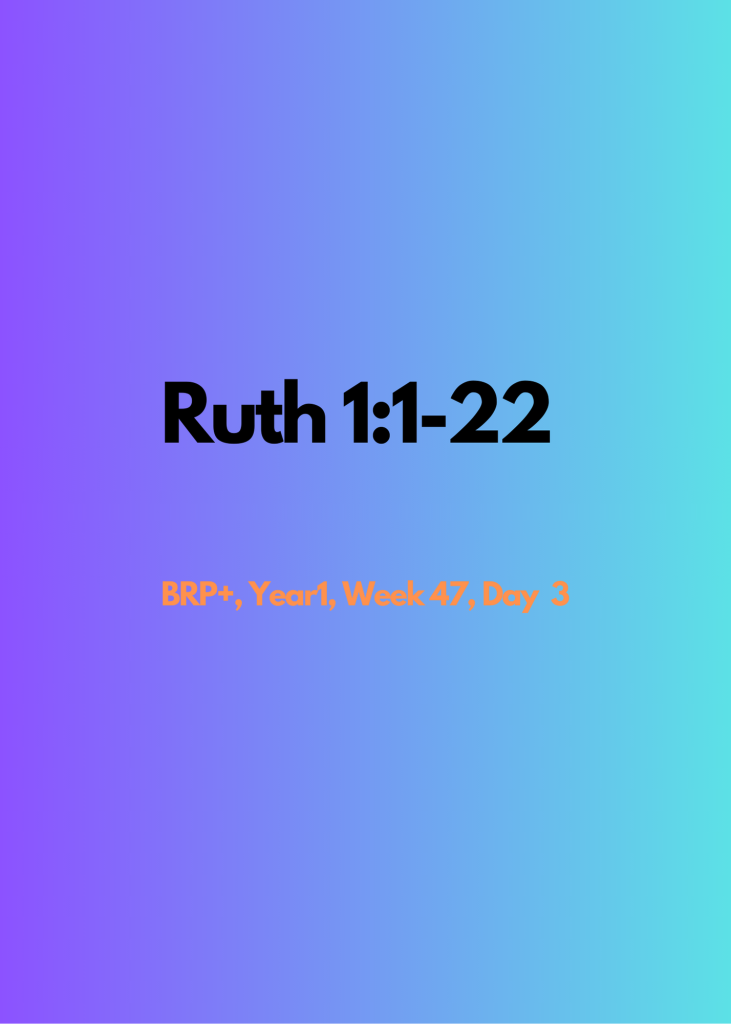Ruth 1:1-22
Q.1. When did this story take place? Why did Elimelech leave Bethlehem? How did things go in Moab? What kept Naomi from returning to Bethlehem? – (Ruth 1:1-4 c.f. Num.25:1-3)
This story shines out like a ray of light during the time when Israel was ruled by judges. Elimelech and Naomi and their sons, Mahlon and Chilion, had left Bethlehem (Meaning: House of Bread) during a time of famine (Ruth 1:1-2). Moab was situated south-west of the Dead Sea. It had led Israel into tragic compromise (Num.25:1-3). Tragedy struck, and Elimelech died (Ruth 1:3). However, the sons – took for themselves Moabite women as wives; the name of the one was Orpah and the name of the other Ruth. And they lived there about ten years (Ruth 1:3-4).
Q.2. Why did Naomi decide to return to Bethlehem? Did she expect her daughters-in-law to join her? What does it say about Naomi that they wanted to return with her to Judah? – (Ruth.1:4-14)
Sadly, both of Naomi’s sons also died in Moab. She decided to return, because she had heard – … that the Lord had visited His people in giving them food (Ruth 1:6). Her daughters-in-law accompanied her part of the way on the long journey back. Naomi then told her daughters-in-law – 8 … Go, return each of you to her mother’s house. May the Lord deal kindly with you as you have dealt with the dead and with me. 9 May the Lord grant that you may find rest, each in the house of her husband (Ruth 1:8-9). Though Naomi had lost all that was precious to her, Ruth and Orpah had seen and admired her faith. When they refused to leave her, Naomi pointed out that there was little prospect of a future with her, besides – … the hand of the Lord has gone forth against me (Ruth 1:13). Consequently, Orpah returned home to Moab. (Ruth 1:14).
Q.3. Why did Orpah return to Moab? What was the basis of Ruth’s commitment to Naomi? Where did Naomi and Ruth end up? What impact did Naomi’s return make? Why? – (Ruth 1:15-19)
Orpah returned to her people and to her gods. However, Ruth had embraced Naomi and the God of Israel. Her response is remarkable – 16 … Do not urge me to leave you or turn back from following you; for where you go, I will go, and where you lodge, I will lodge. Your people shall be my people, and your God, my God. 17 Where you die, I will die, and there I will be buried. Thus may the Lord do to me, and worse, if anything but death parts you and me (Ruth 1:16-17). Naomi could say no more. They travelled on to her hometown of Bethlehem. However, the change in Naomi and in her circumstances was obvious to all the townsfolk (Ruth 1:19).
Q.4. Why did Naomi think her name was inappropriate? Was her view of her past right? Can you identify with her conclusions about God? When did Naomi and Ruth arrive in the land? – (Ruth 1:19-22)
When the people identified her as Naomi (meaning pleasant) she corrected them, suggesting that she should be called Mara (meaning bitter) because – I went out full, but the Lord has brought me back empty. Why do you call me Naomi, since the Lord has witnessed against me, and the Almighty has afflicted me? (Ruth 1:21). She went out full, with her husband and two boys. They had moved away because of a severe famine. Naomi felt that God had punished her, just as people often still do when trials and troubles come. However, God was working to a gracious plan as He always does. Naomi’s fortunes were to change dramatically, for – Naomi returned with Ruth the Moabitess, her daughter-in-law, who returned from the land of Moab. And they came to Bethlehem at the beginning of barley harvest (Ruth 1:22). We must never forget that – His anger lasts only a moment, but His favour lasts a lifetime. Weeping may remain for a night but rejoicing comes in the morning (Ps.30:5). Those who sow in tears will reap with songs of joy. He who goes out weeping, carrying seed to sow, will doubtless return with songs of joy, carrying sheaves with him (Ps.126:5-6).

